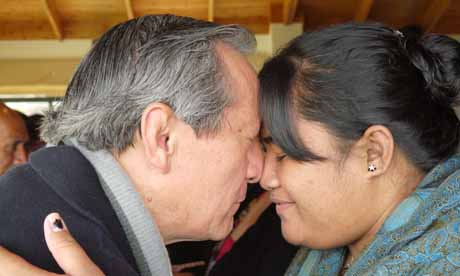The annual Caritas Oceania forum, which began in Auckland on 3 October, was attended by representatives from eight different nations.
About 25 people attended the week-long event, including representatives from Caritas Internationalis, and Catholic Relief Services (CRS) – Asia. Many of the states represented, such as Tonga and Kiribati, are among the most vulnerable to climate change due to their low-lying nature or vulnerable shorelines.
A closing statement from the forum said its members stand ‘in solidarity with the poor and marginalized of the region. We are particularly concerned by the impact of climate change in our area.’
The group heard from New Zealand climate scientist Professor Martin Manning. ‘We keep seeing surprises,’ he said and some changes in climate and impact were happening faster than scientists’ predictions.
Those present spoke of changes they have seen in recent years. Amelia Ma’afu, Programmes Officer for Caritas Tonga, said they were experiencing more coastal erosion and contamination of drinking water as sea levels rose. Young people were planting mangroves and trees for coastal protection and taking action against climate change, but ‘there’s a sense of hopelessness’, because they are isolated, contribute so little to climate change, but are feeling effects more acutely than many other places.
Mavis Tito from Caritas Papua New Guinea said a severe drought was expected in Papua New Guinea next year. ‘Most vulnerable are the highlands and coastal lowlands.’ Food security and water will be a problem.
Clare Baiteke, Chair of the Diocesan Peace and Justice Committee for Kiribati, said they have been running programmes making people aware of the impacts of climate change, and preparing for change. Kiribati President Anote Tong takes every opportunity at international fora to highlight the dangers his nation faces as sea levels rise. People are building sea walls, planting mangroves and installing water tanks to capture rainwater, as groundwater supplies become contaminated.
‘Maybe we see a day when Kiribati is no more,’ she said. ‘But be sure, God loves Kiribati very much – out of the whole universe.’
The forum also considered the impact of mining and large-scale resource extraction in Melanesia, disaster communications planning, political and social change in the Pacific, and how Caritas agencies in the region can genuinely empower the poor and promote integral human development.
CARITAS OCEANIA FORUM STATEMENT
‘And who is my neighbour?’ – Luke 10:29The annual gathering of Caritas organisations from across the Pacific stands in solidarity with the poor and marginalized of the region. We are particularly concerned by the impact of climate change in our area.
The Caritas Oceania Forum was held in Auckland, New Zealand from October 3-7. At the start of the week we were movingly welcomed by tangata whenua. At the opening Mass with Bishop Pat Dunn, Bishop of Auckland, we were drawn into deep reflection on our work. In the gospel of the day we heard the question put to Jesus: ‘And who is my neighbour?’ (Luke 10:29)
In the light of that question we examined our humanitarian response to disasters, the quality of our local development work, our advocacy and the strength of our coordination.
We deepened our understanding of Catholic social teaching. We shared stories of the practice of social concern and social justice. We learnt more about what it is to be poor in different contexts.
We studied the questions of climate change and the effects of mining in our area. We heard the cries of our neighbours, the poor and the earth.
We are grateful to all those who work with us and support us and we reaffirm our commitment to:
Working in solidarity with the poor and marginalized that they may become architects of their own development.
Being responsible stewards of God’s creation and to locally-appropriate sustainable living.
We strongly call upon industrialised countries to be aware that their emissions, policies and lifestyles impact on both the climate and on poor and vulnerable peoples. The earth, Papatuanuku, is our mother and the poor are our neighbours. We are one human family.
Rev Gerard Burns
President of Caritas Oceania
7 October 2011
Source:
- Martin de Jong, Caritas Aotearoa New Zealand
- Image: Caritas Aotearoa New Zealand
